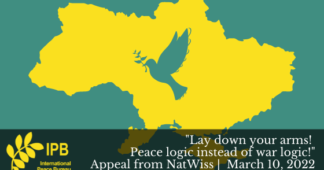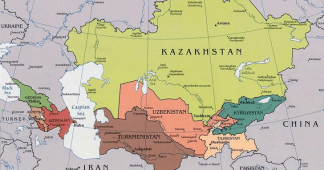While in numerous Western European media with enthusiasm military successes of the Ukrainian army are celebrated, the US government sees in it already a “turn” of the war, the International Federation of Resistance Fighters (FIR) – Federation of Anti-Fascists, which was appointed by the United Nations as “Ambassador of Peace”, renews its fundamental position that peace is possible only with non-military solutions.
During the meeting of the leading body in Budapest the present members of the Executive Committee underlined the following five points:
1. FIR due to his history stands against any aggression war.
2. FIR is always on the side of the victims of war in the war field and outside. Therefore, we stand also against the sanction, which punish the people in all regions of the world.
3. If a country has conflicts with a neighbor, it is not a solution to take arms to solve. We need dialog also on international level.
4. FIR wants peace – we all need peace. Therefore, it is necessary not to send further weapons to the war field, but to start with diplomatic talks to stop the fights.
5. FIR call for a new international conference for collective security in Europe.
These demands are so simple and clear that all political and social forces seriously interested in peace can actually accept them.
We see with satisfaction that there are already in various countries social alliances, activities of peace movements, which are active in the sense of these ideas. But still these voices are too quiet. Therefore the FIR calls: For these goals, it is worthwhile to develop movements in all countries, to bring them into the public discourse.
How important this peace orientation is, shows not only the war in Ukraine, where more and more civilians in all parts of the war zone become victims of the fighting, but also war theaters in other parts of the world, which are largely “forgotten” by the media.
We do not forget the war in Yemen, which has been going on for seven years with the participation of the war coalition led by Saudi Arabia and which, according to the United Nations, has led to the greatest humanitarian catastrophe of our time. Over one million people, including many children and young people, have been victims of the bombardment and starvation. More than 24 million people out of a total of about 30.5 million are in need of humanitarian assistance.
This week, fighting flared up again between Armenia and Azerbaijan, recognizable proxy wars over zones of influence in the Caucasus and access to the region’s gas and oil reserves for Western European countries to use as a substitute for sanctioned gas and oil supplies from Russia. In order to get full access to the natural resources here and at the same time “occupy” Russia with another military conflict, they are even ready to further aggravate the military tensions between two states.
In addition, we see with concern the threat of military confrontation in the Aegean Sea. The dispute with Greece, fueled by Turkey, threatens to turn from a rhetorical exchange of blows into a real war. For years, the Turkish side has been laying claim to islands and spheres of influence. In the shadow of the Ukraine war, it now believes it can assert this.
The fact that both countries are members of NATO again clearly shows that this military alliance cannot play a peace role. The expansion of its military structure will not contribute to peace in Europe either, but will only deepen additional conflicts. Thus, not least political forces in the Baltic States believe to be able to carry out their history-revisionist provocations under the “protection of NATO”.
The FIR remains with it, not armament and military, but only diplomacy and negotiations are the solution – straight for Europe too.
We remind our readers that publication of articles on our site does not mean that we agree with what is written. Our policy is to publish anything which we consider of interest, so as to assist our readers in forming their opinions. Sometimes we even publish articles with which we totally disagree, since we believe it is important for our readers to be informed on as wide a spectrum of views as possible.












